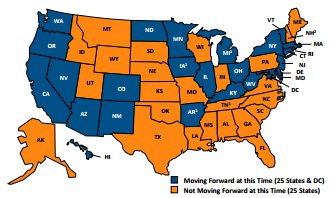
The expansion of Medicaid eligibility to nearly all low-income adults is a core component of the coverage provisions in the 2010 Affordable Care Act (ACA). The ACA Medicaid expansion provides a link between new private coverage options available through either Health Insurance Marketplaces or employers and the existing Medicaid program, which previously had many gaps in coverage for adults. Historically, Medicaid eligibility generally was restricted to low income individuals in a specified category, such as children, their parents, the aged, or individuals with disabilities. In most states, adults without dependent children were not eligible for Medicaid. Further, eligibility levels for parents were generally set very low and varied greatly across states. As a result, only 30% of poor nonelderly adults had Medicaid coverage in 2012, compared to 70% of poor children, and uninsured rates for poor adults (42%) were well over twice the national average (18%).
The expansion of Medicaid, effective in January 2014, fills in historical gaps in Medicaid eligibility for low-income adults and has the potential to extend health coverage to millions of currently uninsured individuals. This expansion essentially sets a national Medicaid income eligibility level of 138% of poverty (about $27,000 for a family of three) for adults.
Population of focus: Low income individuals
Link to resource: Issue brief — The Coverage Gap: Uninsured Poor Adults in States that Do Not Expand Medicaid
Date: 2013
Organization: Kaiser Family Foundation
